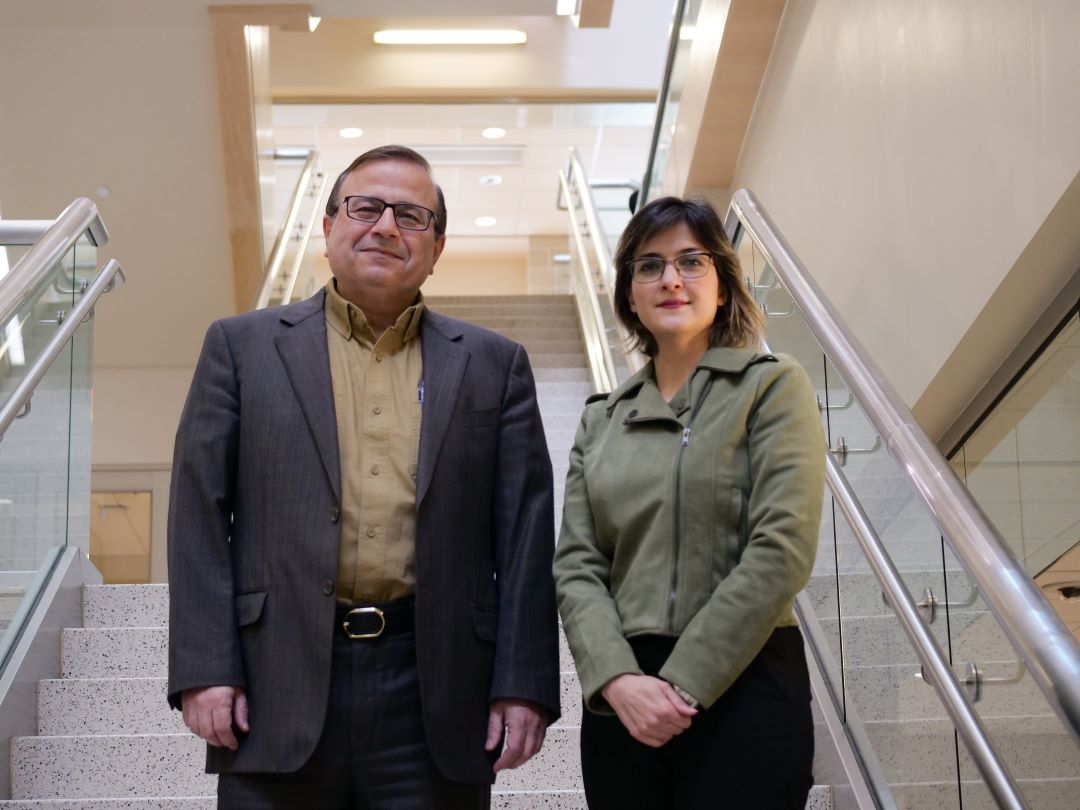
USask spearheads AI-driven detection of early Alzheimer’s through eye screenings
SASKATOON—University of Saskatchewan (USask) researchers Dr. Changiz Taghibiglou (PhD) and Dr. Sara Mardanisamani (PhD) are bridging biology and data science to develop a new, non-invasive AI screening tool for those at risk for Alzheimer’s disease.
The project, “Screening eyes of people in Saskatchewan with non-invasive imaging technologies and artificial intelligence for early detection of Alzheimer’s Disease,” received a $150,000 Impact Grant as part of the Saskatchewan Health Research Foundation (SHRF) Solutions Program. Supporting an interdisciplinary approach to research, the SHRF Solutions Program mobilizes researchers with diverse skills and expertise to help address Saskatchewan health challenges.
It’s estimated that more than 50 million people around the world are currently living with Alzheimer’s disease and related dementias, a number that is set to triple by 2050. In Saskatchewan, 2.3 per cent of people over 65 have been diagnosed with the disease.
According to research recently published in Scientific American, the total annual economic burden of Alzheimer’s disease was more than US$2 trillion in 2019 (an equivalent of C$2.64 trillion), and is forecast to increase to $10 trillion by 2050.
“There is currently no non-invasive method to screen for Alzheimer’s disease, especially when it comes to early detection, which is so crucial to slowing down progression of the disease,” said Taghibiglou, neuroscientist and associate professor in the Department of Anatomy, Physiology and Pharmacology in USask’s College of Medicine. “But they say that the eyes are the windows to the brain, and we believe that changes in the retina and optical nerve can be used to develop a new screening tool that can identify the disease decades before the onset of symptoms.”
The goal of the project is to develop an AI algorithm that could detect very early signs of Alzheimer’s disease using routine ophthalmological scans of the retina, known as optical coherence tomography (OCT). Taghibiglou and Mardanisamani will train an algorithm to identify patterns of degeneration related to Alzheimer’s disease using OCT data from patients in Saskatoon, Regina and Prince Albert.
“We will have access to images that span over 20 years and we will be able to gather information and fine tune our methods for best results,” said Mardanisamani, postdoctoral fellow in the Department of Anatomy, Physiology and Pharmacology in the College of Medicine. Mardanisamani experience in machine learning and image processing during her PhD under supervision of Dr. Mark Eramian (PhD), professor in the Department of Computer Science in the USask College of Arts and Science, laid the foundations for her work with Taghibiglou.
This interdisciplinary project pulls researchers from neuroscience, computer science, medicine and more, including Saskatoon optometrist and Dr. Kerry Bishop (OD) who is co-principal investigator on this project. Other collaborators include Dr. Andrew Kirk (MD), Dr. Ravikrishna Nrusimhadevara (MD), and Dr. Francisco Cayabyab (PhD) from USask’s College of Medicine and USask alumna and ophthalmologist Dr. Melody Wong (MD).
Taghibiglou said the SHRF grant is a lifeline for many scientists in Saskatchewan and is grateful for the investment into his research.
Taghibiglou and Mardanisamani are hopeful that this SHRF-funded research could evolve into a database or app that can help different clinicians collaborate on patient care, improving outcomes for individuals with Alzheimer’s disease in Saskatchewan.
The following USask projects were also recipients of grants from the SHRF Solutions program:
Dr. Peter Hedlin - Co-developing a pathway to reduce postoperative delirium in older patients with cognitive impairment - $49,641.21
Dr. Amanda Froehlich-Chow - We tutuska towin Forging Paths Together: The Co-Creation of Culturally Rooted and Physical Literacy Enriched Early Learning Environments - $149,984.00
Dr. Christopher Phenix - Validation of powerful assays to measure lysosomal GCase in Gaucher Disease. - $150,000.00
Dr. Heather Szabo-Rogers - A personalized medicine team for craniofacial and cardiovascular disorders affecting Saskatchewan’s pediatric population - $150,00.00
Dr. Ivar Mendez - Development of a Culturally-Rooted Pediatric Virtual Care Program to Facilitate Care Closer to Home - $150,00.00
Dr. Jacob Alhassan - Developing and sustaining innovative community-driven transportation solutions for vulnerable youth in Northern Saskatchewan: Evaluating the impact of the Kikinahk free bus service on mental and sexual reproductive health services - $149,972.30
Dr. Kelsey Cochrane - Evaluating whether donated breastmilk is an acceptable and feasible feeding option for individuals living with HIV and their babies - $50,000.00
Dr. Rachel Engler-Stringer - Growing the Good Food for Learning School Food Program - $150,000.00
Dr. Seok-Bum Ko - Synthetic contrast-enhanced MRI for pediatric neuroimaging - $150,000.00
Dr. Humphrey Fonge - Priming nectin-4 positive NSCLC cells for enhanced effectiveness of immune check point inhibitor immunotherapy using a terbium-161-labeled anti-nectin-4 radioimmunoconjugate - $150,000.00
Dr. Ellen Wasan - Enhancing management of Raynaud Phenomenon through efficacy testing of a novel photostabilized topical nifedipine cream and two- way knowledge sharing about RP with health care practitioners and patients in remote and rural communities - $150,000.00
Dr. Felipe Sperandio - Promoting earlier diagnosis of oral premalignant lesions and oral cancer in rural and remote areas of Saskatchewan: an interdisciplinary network approach and new screening tool for health care professionals - $50,000
Dr. Holly Mansell - Facilitating Self-Management Throughout the Lung and Kidney Transplant Journey with HELP (the Health Education and Learning Platform) -$150,000.00
Dr. Juan-Nicolás Peña-Sánchez - Innovating inflammatory bowel disease care through patient navigation for individuals living in rural Saskatchewan and Indigenous community members - $150,000.00
-30-
For more information, contact:
Daniel Hallen
USask Media Relations
daniel.hallen@usask.ca
306-966-6922

